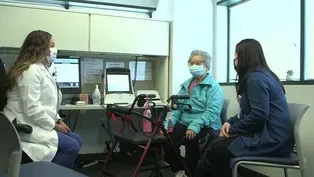
What we know about Biden and McCarthy’s debt limit deal
Clip: 5/28/2023 | 7m 26sVideo has Closed Captions
What we know about Biden and McCarthy’s tentative deal to raise the debt limit
The White House and Congressional Republicans have reached an agreement in principle to raise the debt ceiling and limit new spending. The deal will avert a potentially calamitous federal default if Congress passes it by June 5. Congressional correspondent Lisa Desjardins and NPR’s senior political editor Domenico Montanaro join John Yang to discuss the latest.
Problems with Closed Captions? Closed Captioning Feedback
Problems with Closed Captions? Closed Captioning Feedback
Major corporate funding for the PBS News Hour is provided by BDO, BNSF, Consumer Cellular, American Cruise Lines, and Raymond James. Funding for the PBS NewsHour Weekend is provided by...

What we know about Biden and McCarthy’s debt limit deal
Clip: 5/28/2023 | 7m 26sVideo has Closed Captions
The White House and Congressional Republicans have reached an agreement in principle to raise the debt ceiling and limit new spending. The deal will avert a potentially calamitous federal default if Congress passes it by June 5. Congressional correspondent Lisa Desjardins and NPR’s senior political editor Domenico Montanaro join John Yang to discuss the latest.
Problems with Closed Captions? Closed Captioning Feedback
How to Watch PBS News Hour
PBS News Hour is available to stream on pbs.org and the free PBS App, available on iPhone, Apple TV, Android TV, Android smartphones, Amazon Fire TV, Amazon Fire Tablet, Roku, Samsung Smart TV, and Vizio.
Providing Support for PBS.org
Learn Moreabout PBS online sponsorshipJOHN YANG: Good evening.
I'm John Yang.
Now that the bargaining is done, the sales job has begun.
Today, leaders in both parties began briefing lawmakers on the deal that President Biden in House Speaker Kevin McCarthy reached last night to raise the debt ceiling and limit new spending.
If Congress passes it by June 5, it will avert a potentially calamitous national default.
Here's what we know about the contours of the tentative deal.
It would extend the nation's debt limit until 2025 after the 2024 elections, implement spending caps mostly maintain spending on defense and veteran's health care and expand work requirements were some adults receiving food stamps.
At the capitol today, Speaker McCarthy told reporters it was the best deal he could get.
REP. KEVIN MCCARTHY, House Speaker: It doesn't get everything everybody wanted.
But that's in divided government.
That's where we ended up I think it's a very positive bill.
And I do want to thank the President's team that he put together very professional, very smart, very strong beliefs that are different than ours.
And I think at the end of the day, people can look together to be able to pass this in the House and the Senate.
JOHN YANG: Speaking on CBS News Face the Nation House, Minority Leader Hakeem Jeffries said the Agreement protects some Democratic priorities.
REP. HAKEEM JEFFRIES, House Minority Leader: The agreement that was reached in principle by President Biden does several important things.
In addition to avoiding a devastating default that would hurt everyday Americans, it protects Social Security.
It protects Medicare, it protects Medicaid.
JOHN YANG: Parts of the deal are sure to displease the most conservative House Republicans and the most liberal House Democrats and that could complicate passage.
Let's dig into this with congressional correspondent Lisa Desjardins and NPR Senior Political Editor Domenico Montanaro.
So Lisa, crisis averted we can all go home.
LISA DESJARDINS: Nothing has been that easy for years and especially not with Congress.
It is actually going to be a dramatic couple of days here, John, figuring out especially if the votes are there for this to pass in the House.
It's exactly what you just mentioned.
Not clear that enough house conservatives will back this to combine with enough Democrats.
Let's talk about the conservatives first.
A glaring siren went out on Twitter this morning from a couple of conservatives one of them especially Chip Roy.
I want to show you something that he retweeted from another conservative Senator Rand Paul writing about the deal.
This was fake conservatives agreeing to fake spending cuts.
Now, Chip Roy has been on this program our viewers know him well.
He's important for a few reason.
He's a thought leader among conservatives.
He was one of the holdouts with McCarthy when he was trying to become a speaker, but he also sits on the House Rules Committee, John, he and if two others join him and there are two others who may not like this deal.
Nothing will even get out of committee.
So McCarthy really has to deal with these questions from the right that he didn't get enough.
On the left progressives really up in arms over the work required admits they're learning the details so we'll see how that lands.
JOHN YANG: Lisa, in broad terms, what does this tentative deal do to future federal spending?
LISA DESJARDINS: It does cap spending in a way that we haven't seen.
It ends what has been an incredible spending binge by Congress over the last four or five years Congress and the White House together.
However, it really -- it reshapes the debt curve, but not as much as some people would say needs to happen.
It's a step forward in terms of the debt.
Now, on the other hand, it will mean cuts for some government agencies, we don't know which ones there will be real world effects.
And those work requirements for food stamps, specifically, those could affect thousands of people.
On one hand, Republicans say maybe more people will go out and get a job.
And the other hand, Democrats say no, thousands of people could lose a critical benefit.
JOHN YANG: Domenico, all along it seems these negotiations.
So what we've known about these negotiations have been on the Republican terms, the spending cuts, the work requirements.
Did the White House feel pressured to get this done?
DOMENICO MONTANARO, NPR: Well, we know that the White House had basically said that they were abstaining from negotiating over this because they felt like morally, it was not the right thing to do.
Now, Republicans control one chamber of Congress.
And eventually if they were going to hold out the White House was going to have to come on board as well.
And you know, President Biden has been able to get deals done over the years with Republicans.
He was one person who had negotiated on this very thing in 2011.
In previous years, right.
So, we know that Biden was somebody who's been targeting the middle as well.
And you know, we've been talking about the extremes on the left and the right, boy, political messaging wise, this being kicked past 2024.
And Biden being able to say, look, we made a deal that was compromised, and I'm targeting the middle, that sounds like music to his ears when it comes to being able to win over those swing voters.
JOHN YANG: And on the other side, Speaker McCarthy, I think a lot of people remember the 15 ballots it took for him to get the office.
Has his stature been raised by this?
DOMENICO MONTANARO: Well, I think if this does get passed, right, then this will be a huge sigh of relief for McCarthy, because this will probably be the last test of something real that he has to get past other than potential other show votes, because this has to get done.
This isn't something that, you know, they were looking to get some kind of compromise bill done, this is something that they have to pass otherwise, the results would be catastrophic.
So, pushing this past 2024, past that election, McCarthy will be able to say that he was able to work with the White House able to get something done, and that it does help show that he was able to, you know, get something through even in a conference that isn't necessarily prone to want to compromise, JOHN YANG: Lisa, what's coming ahead, you talked about the possibility of may not get out of rules may not even get to the floor.
But what should we be looking for in the days ahead?
LISA DESJARDINS: Well, the hoped for plan by the leaders who want this to pass is that it would get to the House floor for a vote on Wednesday.
Now, let's talk about when the deadline is it's a week from Monday.
So that just leaves nearly five days to get through the House and then get through the Senate, the Senate is so slow.
And it can be slowed down as much as possible by people like Rand Paul, who don't like this deal.
If you run the clocks in the Senate, it's almost like the math doesn't quite work.
I have a feeling once they get through one vote and they start going, perhaps if the markets react and things will speed up.
I think it's all to say, John, this is very close.
Getting this far is extraordinary.
This was a hard deal to make.
But it is still like trying to maneuver an aircraft carrier through a sea full of icebergs.
They are not through it yet the next week will be critical.
DOMENICO MONTANARO: But sometimes they're able to put, you know, like a speedboat behind the aircraft carrier or they'll jump on vote and go on some other vehicle because they somehow figure out different kinds of rules to get things through when they want to do it quickly.
So we'll see if that winds up becoming the case.
But if there is this kind of market pressure, in particular, where you have middle of the road Democrats and those sort of Main Street Republicans, they hear that I think there could be some pressure to move more quickly.
JOHN YANG: Lisa, whenever we come to the precipice of a default, there's always talked about doing away with the debt ceiling.
Is there's talk about that now.
And do you think it would happen?
LISA DESJARDINS: There has been talk about that, but there is not -- it's not very loud.
And it's not by the most muscular forces in Congress right now.
Both parties, it's sort of like the filibuster.
They're worried that when they're out of power, it's something that they can use as a tool.
Republicans more than Democrats, but it's not serious talk of getting rid of it right now.
JOHN YANG: Lisa Desjardins, Domenico Montanaro, thank you very much.
DOMENICO MONTANARO: Thank you.
Lisa Desjardins: Welcome.
An Army bugler’s story about his special wartime assignment
Video has Closed Captions
Clip: 5/28/2023 | 2m 23s | An Army bugler’s story about his special wartime assignment (2m 23s)
The heroic actions of Capt. Francis Brown Wai in WWII
Video has Closed Captions
Clip: 5/28/2023 | 2m 27s | The heroic actions of Capt. Francis Brown Wai in World War II (2m 27s)
Why medical interpreters can be a vital but scarce resource
Video has Closed Captions
Clip: 5/28/2023 | 8m 33s | For many Asian Americans, medical interpreters are a vital but scarce resource (8m 33s)
Providing Support for PBS.org
Learn Moreabout PBS online sponsorshipSupport for PBS provided by:
Major corporate funding for the PBS News Hour is provided by BDO, BNSF, Consumer Cellular, American Cruise Lines, and Raymond James. Funding for the PBS NewsHour Weekend is provided by...













